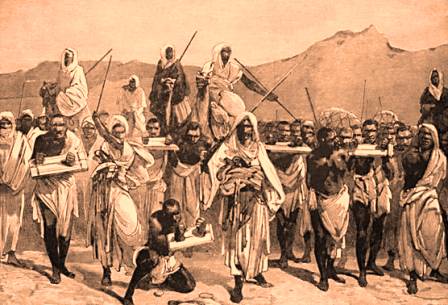Published: may 18 (updated: may 20), 2010; Praising Military Slavery.
By Daniel Pipes,
If Saleh Al-Fawzan, a prominent Saudi religious figure justifies slavery in Islam, why not an Egyptian writer praise the Muslim practice of slavery?
In an article titled “The Polity of Islam and the Treatment of Slaves” appearing on the popular Arabic-language news website Moheet (English translation here), Mu’min ad-Dassuqi softens and extols the Muslim slave system:
in Islam, slaves were raised properly, and great leaders emerged from them, especially in the era of the Mamluks who ruled the world. In other words, slaves were not treated in a manner that did not respect their humanity and dignity.
The Mamluks whom he refers to were the slave-rulers of Egypt from 1250 to 1517 A.D., surely the most bizarre dynasty in world history. Dassuqi recounts the education of a typical slave soldier, his advance through the system, culminating in his possibly becoming head of state – all without ever becoming free.
Comments:
- Dassuqi uses my 1981 book, Slave Soldiers and Islam (summarized here), as a foil for his riff.
- He mangles what I wrote. For starters, he claims I “attacked the Islamic religion,” which is something I have never done. I challenge him to document this statement.
- Unsurprisingly, Dassuqi also gets basic historical facts wrong. For one, the Mamluks hardly “ruled the world”; Egypt and Syria, yes, and at times the Hijaz and into Libya, but not more.
- He deceives by comparing ordinary slaves in the West to elite slaves in the Muslim world. Would he lavish similar praise on the condition of the wretched Zanj in Iraq or of female sex-slaves through the centuries? Even among elite slaves, it is preposterous to claim they enjoyed respect for “their humanity and dignity.” Slavery was inhumane and undignified at every step.
- This justification of military slavery shocks me. During my long years of working on this subject during the 1970s, I admit, it never occurred to me that Muslims would one day embrace this repulsive institution of an earlier age.
- “Everything Muslim is good” would seem to be Dassuqi’s mentality. That he defends the indefensible points to the present state of Islamist domination and Muslim moral impoverishment.
- Egregious as Dassuqi’s article is, it compares favorably with the experience I had just over a decade ago with an Egyptian diplomat. Here is a letter I wrote on December 9, 1999 to Ambassador Ahmed Aboulgheit at Permanent Mission of the Arab Republic of Egypt to the United Nations in New York:
I write to protest the behavior of a member of your staff, Mr. Ahmed Darwish.
Mr. Darwish on Dec. 8 came as a guest to an event on slavery in the Middle East sponsored by my organization, the Middle East Forum. At one point, when I, acting as moderator, mentioned that I have written a book on slavery and began to speak about the treatment of this issue in the Holy Qur’an, Mr. Darwish loudly and rudely interrupted me. He demanded the floor and would not let me continue speaking. I repeatedly asked him to be quiet so I could proceed with my analysis, offering him a chance to speak afterwards. He repeatedly refused to do so, instead insulting me and announcing that he would “die for Islam.”
Only when I called for security agents to come to the room where our meeting was taking place did Mr. Darwish leave. Even then, his rude behavior continued, as he demanded (and received) from my staff the return of the money he paid for lunch.
A number of those in attendance, including several women, later expressed their fear that Mr. Darwish was anned and would use violence. For your infonnation, this entire exchange is on audiotape, should you wish to hear it.
Mr. Ambassador, I have had the privilege of living for three years in your country and I know that this is not the way that Egyptians act – and especially not a diplomat who represents his country. I hope you will issue a public reprimand to Mr. Darwish as well as an apology to me and, through me, to all those who attended yesterday’s meeting.
Another person at the same event also wrote to Aboulgheit, one day later:
I regret to have to write to you in connection with an unfortunate outburst by one of your staff members, Mr Ahmed Darwish, at a recent event which the Forum sponsored in New York City.
… the intemperance and perceived potential violence of Mr. Darwish’s behavior alarmed and frightened many of the people in attendance at our Forum. Never before have we had to call for security people to come to one of our meetings and I am most sorry to say that that was occasioned this time by an Egyptian diplomat. …
To have Mr. Darwish tell Dr. Pipes. our director and a renowned scholar, that he was not entitled or permitted to have an opinion or to speak about anything to do with the Holy Qur’an, flies in the face of everything that Americans believe about an open society, free speech and intellectual and academic pursuits. I can assure you that, in the eyes of the people in attendance, his outburst did much damage both to their perception of Egypt as well as to our understanding of how these kinds of issues are or are not dealt with in the Middle East.
I hope that you will take appropriate steps to make amends for Mr. Darwish’s behavior and to assure that that kind of behavior is not repeated by anyone representing your fine country.



 RSS
RSS











Praising Military Slavery #islam #islamism http://j.mp/ckgCsg
Praising Military Slavery #islam #islamism http://j.mp/ckgCsg
RT @CrethiPlethi: Praising Military Slavery #islam #islamism http://j.mp/ckgCsg